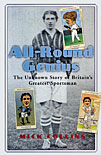 The Unknown Story of Britain’s Greatest Sportsman
The Unknown Story of Britain’s Greatest Sportsman
by Mick Collins
Aurum Press, £14.99
Reviewed by Ian Farrell
From WSC 243 May 2007
Living in an age when sporting versatility means being able to answer one of Sue Barker’s tricky “away” questions, the fact that Ian Botham once had a few run-outs for Scunthorpe seems extremely impressive to me. That Denis Compton won the FA Cup with Arsenal verges on the surreal. But even Compton starts to seem hopelessly limited after reading Mick Collins’s excellent biography of Max Woosnam: captain of his country in both football and tennis, Olympic gold medallist, scratch golfer and Lord’s centurion. Applying the word “genius” to sportsmen is always contentious, but rarely has the term “all rounder” been better deserved.
Like the other great multitalented sportsman of the era, the considerably more celebrated CB Fry, Woosnam was a resolute amateur and fun-loving “character” from a public school/Oxbridge background. Unlike many of his contemporaries, however, he didn’t have a private income to fund the recreational life and so his decision to eschew professionalism was all the more incredible. Despite Collins’s best efforts, it is never conclusively explained why he did this and it highlights the one downside of the book: that the enigmatic Woosnam didn’t seem to have much to say. The facts and figures of his career are well documented, but his thoughts, opinions and the exact reasons for his actions are often harder to come by.
It’s a fascinating story and exhaustive research brings the period alive brilliantly. In addition to a football career as the modern fan would recognise it, the narrative ricochets between Edwardian Cambridge, the famed amateur side Corinthians, the battlefields of Gallipoli, the 1920 Olympics and time spent hobnobbing with the rich and famous (while in Los Angeles he manages to beat Charlie Chaplin at table tennis using only a butter knife – a remarkable feat and a perfect pop culture snapshot of carefree Twenties glamour).
His major footballing achievements came at Manchester City, who happened to offer him a game after his job took him north. His performances as a fearless centre-half made him a hero to the fans and his team-mates, who took the incredible step of asking the manager to make the amateur-amongprofessionals captain of the side.
The Ripping Yarns-like tales of dash and valour take an ugly turn towards the end of the book when it details how Woosnam, by then retired but still beloved by the working people of Manchester, broke the 1926 General Strike and drove a bus for his employer. Collins treads carefully, sympathetic to the masses left feeling betrayed but also understanding towards his subject. As his Margot Leadbetter-esque daughter explains brusquely, to get on with it and get things done without complaining was simply “the Woosnam Way”.
With its period setting and multidiscipline scope, it might not appeal to many modern football readers, but it would be difficult to find a better written and more interesting sporting biography in recent times. Woosnam’s story deserves to be told and All Round Genius deserves an audience.